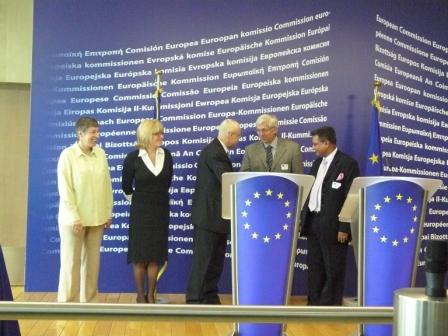Green paper on EU health workforce: Commissioner Vassiliou calls for social partners’ contribution
Press Communication
European Hospital and Healthcare Employers’ Association (HOSPEEM)
European Federation of Public Service Unions (EPSU)
On Monday 14 July a joint Hospital Social Partner delegation met Commissioner Vassiliou.
Commissioner Vassiliou explained the rationale for promoting the Cross-border Healthcare Directive. She underlined in particular the need for better collaboration between the Member States as well as the establishment of centres of excellence as one major objective of the directive. Christina Carlsen, while welcoming the intention of bringing legal clarity, expressed HOSPEEM’s concern that the planning capacity at national level might face new challenges. “It will be difficult to foresee what flow of patients we have to expect”, said HOSPEEM Vice Secretary General. According to the Commission services this directive would count for 1 % of the EU population with a perspective to increase to 4 % in the future. The bulk of medical treatment will continue to be delivered at home. Where medical treatment is sought abroad this will be delivered mainly under the provisions of regulation 1408, for example during major sports events. “If this is the case, why not adapt the existing regulations in accordance with EU jurisprudence?” asked Carola Fischbach-Pyttel, EPSU.General Secretary. “We therefore wonder what exactly the added value of the proposed directive will be?”
Importantly, Commissioner Vassiliou agreed on the need to develop structured cooperation with the Hospital Social Partners in the future. DG SANCO intends to publish a Green paper on health workforce, in December 2008.
The European-wide lack of qualified health professionals and the migration of health care professionals within and across the European Union borders require a common policy at European level.
Commissioner Vassiliou invited the social partners to address the questions related to health staff shortages in Europe. “The role of employers and workers is a key factor when it comes to successfully developing and implementing these policies”
The starting point for an had hoc input of the social partners to the ongoing Commission work will be the Code of Conduct and follow up on Ethical Cross-Border Recruitment and Retention in the Hospital Sector, signed in April 2007. The text deals with many of the aspects the Commission is intending to tackle, such as strategies to promote ethical cross border recruitment and to prevent acute staff shortages in the so called “donating countries”.
The meeting of the Health Commissioner with the EPSU and HOSPEEM leadership marks a significant step in the relations between the European Commission and European Social Partners in the hospital sector.
-ends-
For further information, please contact:
HOSPEEM: Gin Ngan +32 2 229 21 58, hospeem@hospeem.eu
EPSU: Tamara Goosens +32 2 250 10 80, tgoosens@epsu.org
EPSU is the European Federation of Public Service Unions. It is the largest federation of the ETUC. 8 million public service workers and their 213 trade unions are members. They organise workers in health and social services, local and national administration, energy, water, waste.In the health and social services sector EPSU organises 3.5 million members
HOSPEEM is the European Hospital and Healthcare Employers Association. It regroups at European level national employers’ associations operating in the hospital and health care sector and delivering services of general interest, in order to co-ordinate their views and actions with regard to a sector and a market in constant evolution. HOSPEEM is an individual member of CEEP






Recent Comments